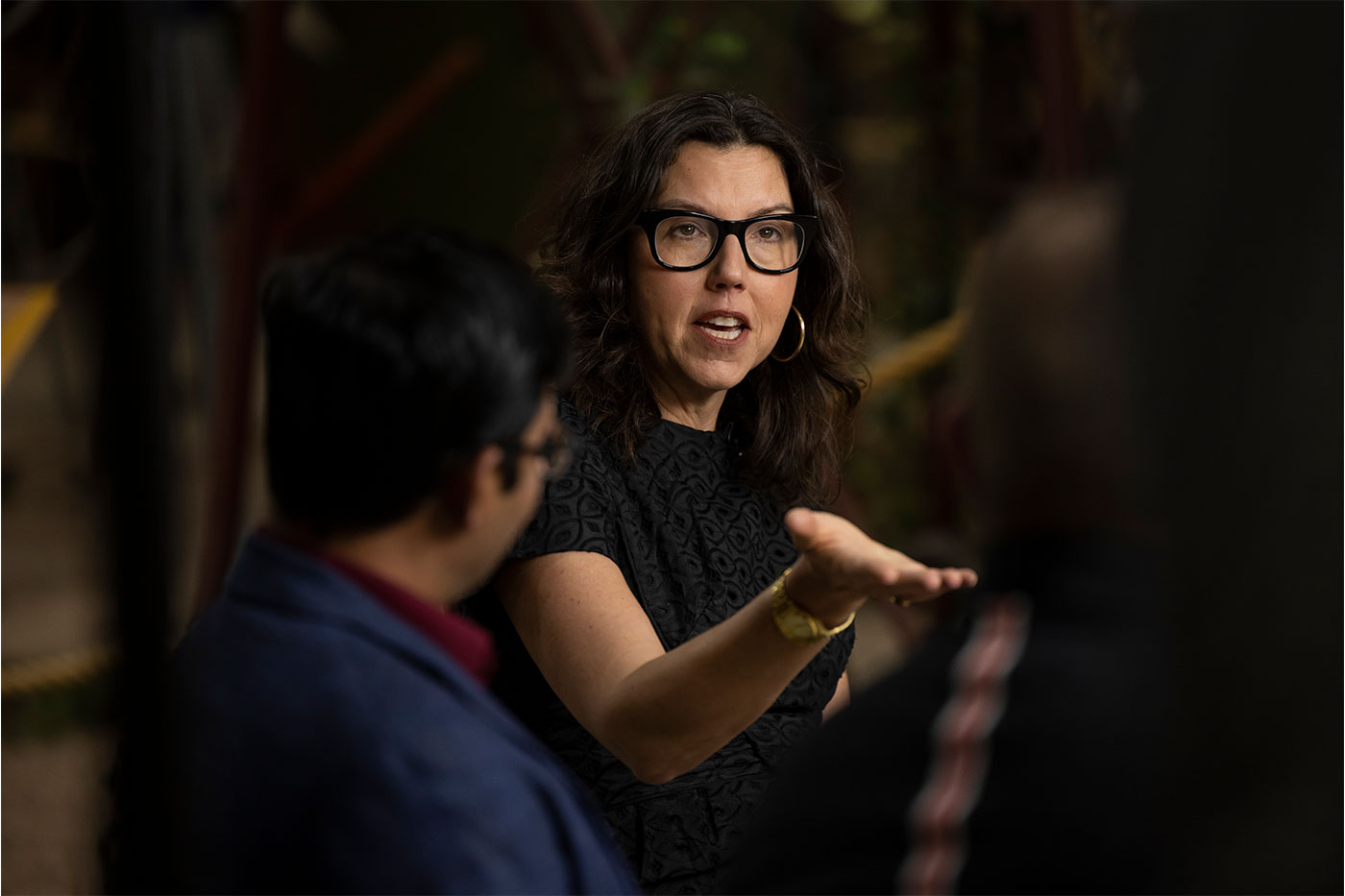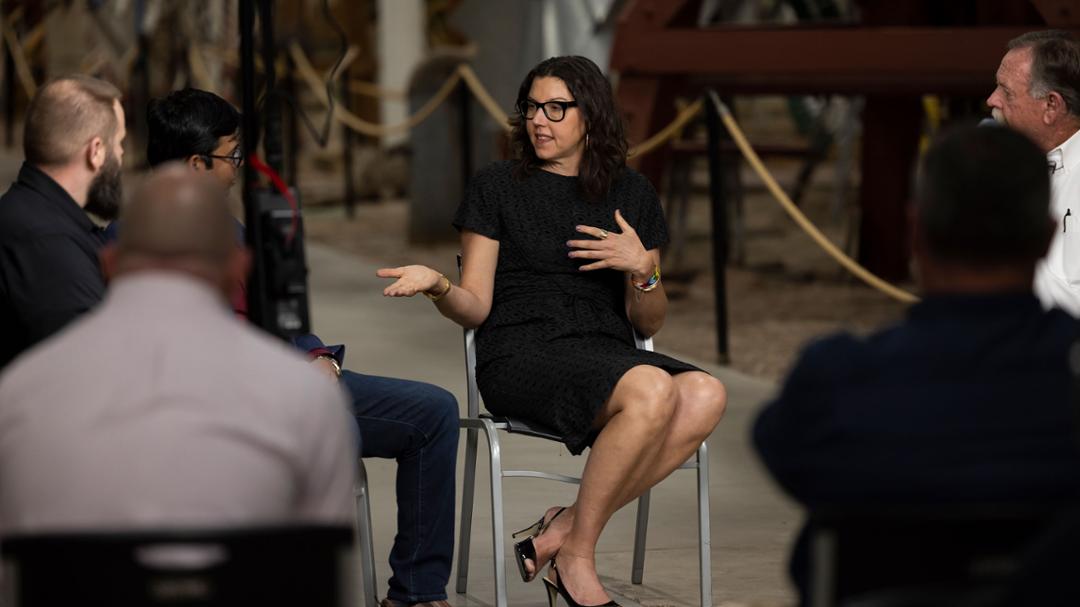Amy Hardberger and her students in the School of Law’s Center for Water Law & Policy are utilizing science and law to solve problems that affect us all.
Water connects us.
It’s difficult to determine where it begins and ends. It’s a force that moves us forward and sustains us. However, the water cycle taught in elementary science slowly fades into the background of day-to-day life. Over the years, it becomes ignored and taken for granted.
Yet, it’s presence is essential. From electricity to food, water is the key ingredient that keeps our world running. But what would happen if we ran out? Whose job is it to keep that from happening?
These are questions that the Center for Water Law & Policy at Texas Tech University’s School of Law is working to answer. At the helm of that charge is Amy Hardberger.
Always Outdoors
Hardberger’s family is from West Texas; her grandparents were farmers. You have only to trace her family line two generations to see how vital the red clay soils and cotton fields were to their livelihood.
Hardberger’s father was born in a cotton gin.
“I guess that was his family’s version of a home birth,” Hardberger muses.
Her parents moved to San Antonio and pursued careers in law and art curation. Hardberger was an only child and describes herself as a latchkey kid – entertaining herself after school until her parents arrived home.
She gravitated toward two things growing up: the outdoors and justice.
She spent summers floating the Guadalupe River, a regular reprieve for 100-plus degree days in Central Texas. She canoed, hiked, climbed and camped. She also had an early love of learning. Hardberger’s favorite class in high school was AP English. Two books moved her so much that she rereads them even now, “Crime and Punishment” and “The Scarlet Letter.”
Even while reading, she preferred to be outside. Despite living in a big city, Hardberger often felt drawn back to the basics.
“I was always outdoors,” she says.
She climbed trees and waded into creeks rather than burrowing down inside with video games or television shows.
In fact, she doesn’t spend any time talking about television shows she’s following or recent movies she’s seen. One glance around Hardberger’s office shows an affinity for other forms of entertainment: landscape photography she’s captured, pieces of art from other countries, and a stack of books on land use and property law.
These are the things that excite Hardberger.

But her all-consuming interest is water.
Mother Earth’s fastest-shrinking resource is the topic of much conversation these days. Who controls it? Should anyone control it? Who decides where it goes? How it is used?
These are the questions Hardberger turns over in her mind. She poses these questions to her students, and she invites as many disciplines as she can into the discourse. After all, water touches everything, so everyone should be in the conversation.
The Larger Picture
Hardberger is quick to point out she is not a lobbyist. She considers herself an advocate for water law and policy, but in a more academic way.
“I do a lot of translating between scientists and lawyers.”
“I enjoy connecting the dots for policymakers," she says.
Hardberger is uniquely equipped to do this. With bachelor’s and master’s degrees in geology and a Juris Doctorate from Texas Tech, she has crafted her own career.
After attaining her master’s degree, she worked as a geoscience consultant for the government. Her team was tasked with evaluating closed air base sites used by the U.S. Air Force. She would assess environmental issues that would need to be cleaned up before the government could sell the land.
“You’re looking at all kinds of solvents and pesticides in the soil,” she explains.
Some sites she assessed were in better shape than others. In one case, she found dozens of 55-gallon drums buried under the ground filled with toxic sludge that took time to identify.
Hardberger says there was a certain satisfaction to the job. But at the end of the day, her mind kept wandering toward the larger picture.
“I wanted to be more involved with policy,” she recalls.
Hardberger began to consider law school, a concept she’d never entertained before. She loved science but she also realized that to affect real change, she’d need more than just scientists in her corner.
Finding Her Place
She was referred to a water attorney named Russ Johnson. They discussed Hardberger’s career goals over breakfast. By the time she’d taken the last sip of coffee, Hardberger knew law school was her next step.
She applied to a few schools, but Texas Tech was her first choice because of its focus on water law. She was turning 30 by the time she became a student again and described herself as a nontraditional student, even for law school.
Many students go straight from undergraduate to law school, but she was glad she did it the way she did.
“I was a better student because of my age.”
“I knew a little bit about the world and understood the human condition in a way I probably wouldn’t have had I gone straight through,” she says.
Hardberger notes many nontraditional students are enrolling in law school now. Her advice is to stay humble.
“I see students enroll at 50, and that’s a hard thing to do, to start at the bottom again,” she says. “No matter how old you are, when you’re a lawyer, you start at square one – period.”
When Hardberger was at square one, the challenges of her first year were eclipsed by inspiration she drew from professors such as Frank Skillern and Gabriel Eckstein. Eckstein held the position Hardberger now has – the George W. McCleskey Professor of Water Law.
When Hardberger was going through law school, teaching was not part of her plan. She anticipated doing nonprofit advocacy work. But as she grew as a legal writer and scholar, she realized academia was the perfect place for her.
“I’m not good at repetition,” she admits. “I need many things to keep me busy and I constantly come up with new ideas. So, a university is a great fit for me.”
After graduating with her Juris Doctorate in 2005, Hardberger became a visiting professor at Texas Tech and then took a position at St. Mary’s School of Law as a professor, associate dean, and later, associate vice provost for academic operations.
But when the George W. McCleskey Professor of Water Law position became available in 2020, Hardberger knew it was time for her to come back to West Texas.
Teaching & Transforming
In addition to publishing academic research, traveling to consult and working alongside policymakers, Hardberger is first and foremost a teacher. A role at which she’s very good.
Danielle Craig is a graduate instructor at Texas Tech, and is earning her doctoral degree in Land Use Planning Management & Design. Craig first met Hardberger in law school more than 10 years ago.
“Amy was always approachable,” Craig says. “She asked good questions and interacted with students in a way that brought out my best work.”
Like Hardberger, Craig is launching the second act of her career by returning to Texas Tech to earn a doctoral degree after a decade of practicing law. With professors like Hardberger as role models, Craig is fusing her interests into a career that’s perfect for her.
“I’ve never felt stuck studying with Amy or being at Texas Tech,” Craig says. “I know I can be successful in whatever I want to do.”
Samantha Tweet is an associate attorney at Lloyd Gosselink Rochelle & Townsend, P.C., in Austin. She graduated from Texas Tech’s School of Law earlier this year.
“I loved being outdoors growing up,” she said, much like her mentor. “So, when I first took Hardberger for property law, that class stood out to me.”
Tweet says Hardberger designed the course differently than most law classes. This alternative method of hands-on assignments rather than just a final at the end of the semester resonated with Tweet as a learner.
“I found it to be incredibly beneficial,” she says.
From that first class to the day Tweet took the bar exam, Hardberger was in her corner.
“Right before I sat for the bar, I got nervous and texted Amy. She responded, ‘You’ll be fine and if for some insane reason you do not pass, you’ll still be the same person loved by the same people. You’ll just do it again – but I’m not worried.’”
She passed with flying colors.
Tweet summarizes water law as “getting water to people and areas that need it most and navigating the dynamics around that.”
This is the problem Hardberger is fixed on solving. She brings her students and colleagues along with her to find solutions. She’s created many interdisciplinary projects and collaborations between the School of Law and other colleges on Texas Tech’s campus.
“It comes down to the power of relationships,” Hardberger said.
“You want to do everything you can so when opportunity comes, you’re ready.”
Hardberger is not only ready, but she is the expert who comes to mind when the public wonders and worries about the future of clean water. Whether it’s at the state’s capitol or on NPR or the Texas Standard, Hardberger is leading the conversation on how we think about water.
Like most problems, the pain point lies in our attitude about this resource, and then stems to behavior. Hardberger and the rest of the Center for Water Law & Policy hope to get people thinking in a proactive way.
“I think with water, and with other things, we don’t want to face hard truths,” Hardberger says. “We won’t face them until they’re obvious. But water requires proactivity because once it’s gone, there may not be a reaction that can bring it back.”

